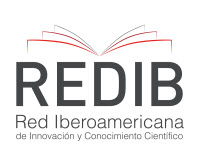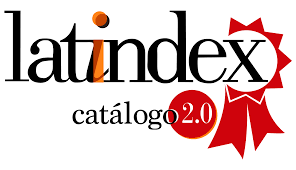
Esta obra está bajo una licencia internacional Creative Commons Atribución-NoComercial-CompartirIgual 4.0.
Esta obra está bajo licencia internacional https://creativecommons.org/licenses/by-nc-sa/4.0/deed.es
La revista (y sus contenidos) emplean las licencias Creative Commons, específicamente la del tipo CC BY NC SA 4.0, la cual establece que “el beneficiario de la licencia tiene el derecho de copiar, distribuir, exhibir y representar la obra y hacer obras derivadas siempre y cuando reconozca y cite la obra de la forma especificada por el autor o el licenciante”. La licencia del tipo CC BY NC SA 4.0 contempla tres categorías,
- Atribución.
- No Comercialización de la obra.
- Compartir igual
Los lectores son libres de:
- Compartir — copiar y redistribuir el material en cualquier medio o formato
- Adaptar — remezclar, transformar y construir a partir del materialLa licenciante no puede revocar estas libertades en tanto usted siga los términos de la licencia
- Siempre y cuando se respeten y contemplen la atribución de autoría y la no comercialización del material.
Resumen
Este artículo hace una revision de la literature sobre liderazgo transformacional, lo aplica al contexto único de educación superior y detalla una intervencion educativa de liderazgo tranformacional dirigida a supervisores docentes en instituciones de educación superior en Panamá. El estudio de métodos mixtos evaluó el impacto de la intervención en las perspectivas y actitudes de los participantes. Los resultados demostraron que el programa de desarrollo professional fue efectivo en generar reflecciones entre los supervisores docentes, quienes reflejaron un entendimiento profundo de la importancia del liderazgo transformacional como herramienta para influir en el docente y potencialmente mejorar los niveles de engagement del docente.
Palabras clave:
Citas
Aryee, S., Walumbwa, F. O., Zhou, Q., & Hartnell, C. A. (2012). Transformational leadership, innovative behavior, and task performance: Test of mediation and moderation processes. Human Performance, 25(1), 1-25. doi:10.1080/08959285.2011.631648
Avolio, B. J., & Bass, B. M. (1999). Re-examining the components of transformational and transactional leadership using the Multifactor Leadership Questionnaire. Journal of Occupational & Organizational Psychology, 72(4), 441-462.
Bass, B. M. (1985). Leadership and performance beyond expectations. New York: Academic Press.
Bass, B., & Avolio, B. (2004). Multifactor Leadership Questionnaire: Manual and Sample Set. Mind Garden, Inc. Retrieved from: https://www.mindgarden.com/16-multifactor-leadership-questionnaire'>https://www.mindgarden.com/16-multifactor-leadership-questionnaire
Bass, B., & Avolio, B. (2018) MLQ Trainer’s Guide: Training Full Range Leadership. Mind Garden, Inc. Retrieved from: https://www.mindgarden.com/16-multifactor-leadership-questionnaire'>https://www.mindgarden.com/16-multifactor-leadership-questionnaire
Bayram, H., & Dinç, S. (2015). Role of transformational leadership on employee's job satisfaction: The case of private universities in Bosnia and Herzegovina. European Researcher, 93(4), 270-281. doi:10.13187/er.2015.93.270
Breevaart, K., Bakker, A., Hetland, J., Demerouti, E., Olsen, O. K., & Espevik, R. (2014). Daily transactional and transformational leadership and daily employee engagement. Journal of Occupational & Organizational Psychology, 87(1), 138-157. doi:10.1111/joop.12041
Burns, J. M. (1978). Leadership. New York, NY: Harper & Row.
Choochom, O. (2016). A causal relationship model of teachers' work engagement. International Journal of Behavioral Science, 11(2), 143-152.
Creswell, J. W., & Plano Clark, V. L. (2011). Designing and conducting mixed methods research. Thousand Oaks, CA: Sage
Dunbar, D. (2014). Communication – putting the manners (back) into management. Perspectives: Policy and Practice in Higher Education, 18(3), 84-89, doi:
10.1080/13603108.2014.938138
Judge, T. A., & Piccolo, R. F. (2004). Transformational and transactional leadership: A meta-analytic test of their relative validity. Journal of Applied Psychology, 89, 755–768. doi:10.1037/0021-9010.89.5.755
Kahn, W. (1990). Psychological conditions of personal engagement and disengagement at work.
Academy of Management Journal, 33, 692-724. doi:10.2307/256287
Kouzes, J., Posner, B. (n.d.). The Leadership Challenge Workshop: Participant Workbook. Retrieved from: www.leadershipchallenge.com.
McCarley, T. A., Peters, M. L., & Decman, J. M. (2016). Transformational leadership related to school climate. Educational Management Administration & Leadership, 44(2), 322-342. doi:10.1177/1741143214549966
Robbins, S. P., & Judge, T. A. (2011). Organizational behavior. Upper Saddle River, NJ: Prentice Hall.
Saldaña, J. (2009). The coding manual for qualitative researchers. Los Angeles, CA: SAGE.
Sayadi, Y. (2016). The effect of dimensions of transformational, transactional, and non-leadership on the job satisfaction and organizational commitment of teachers in Iran. Management in Education (Sage Publications, Ltd.), 30(2), 57-65. doi:10.1177/0892020615625363
Shuck, B., & Herd, A. M. (2012). Employee engagement and leadership: Exploring the convergence of two frameworks and implications for leadership development in HRD. Human Resource Development Review, 11(2), 156-181. doi: 10.1177/1534484312438211
Shuck, B. and Wollard, K. (2010), “Employee engagement & HRD: A seminal review of the
foundations”, Human Resource Development Review, Vol. 9 No. 1, pp. 89-110. doi: 10.1177/1534484309353560
Smart, J. (2005). Attributes of exemplary research manuscripts employing quantitative analyses. Research in Higher Education, 46(4), 461-477. doi: 10.1007/s11162-005-2970-5
Walumbwa, F. O., Cropanzano, R., & Goldman, B. M. (2011). How leader-member exchange influences effective work behaviors: Social exchange and internal-external efficacy perspectives. Personnel Psychology, 64, 739–770. doi: 10.1111/j.1744-6570.2011.01224.x
Walumbwa, F. O., Lawler, J. J., Avolio, B. J., Wang, P., & Shi, K. (2005). Transformational leadership and work-related attitudes: The moderating effects of collective and self-efficacy across cultures. Journal of Leadership and Organizational Studies, 11(3), 2-16. doi: 10.1177/107179190501100301


















